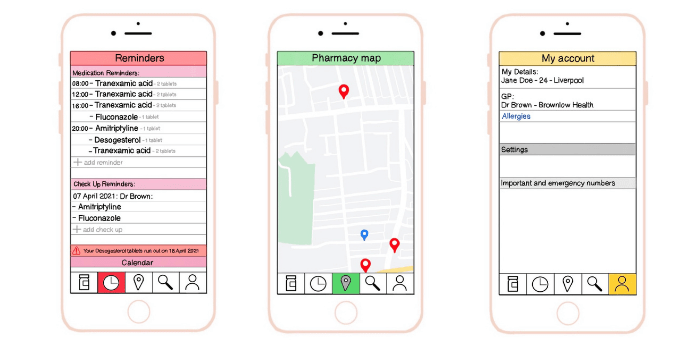
Year One student doctors put their leadership and team working skills to the test when they stepped into the Dragon’s Den to pitch their original medical app idea to a fiery and fearless panel of judges.
As a key and enjoyable element of the MBChB programme, year 1 students are usually whisked off to Altcar training camp during their first term to take on a series of gruelling physical and mental exercises as part of their introduction to Clinical Team Leadership.
With COVID-19 restrictions in place, the year 1 team landed on an invigorating alternative which saw the year group split into groups to compete for investment and buy in from a diverse panel of medical, educational and tech innovation experts.
One such panellist was Lt Col Helen Ball from the Queen Alexandra's Royal Army Nursing Corps, who usually runs the Altcar experience. “It was certainly a disappointment to the team at 208 Field Hospital that we were unable to deliver the usual year 1 experience for students, providing them with foundations of team building and communication skills, alongside physical and mental challenges to take them out of their comfort zone."
While the Dragons Den concept didn’t challenge the teams physically as the military programme would, it certainly delivered on all the other aspects in abundance.
Students were tasked with developing a hypothetical app suitable for use in medicine, health or education. Their work needed to include market research, costings, as well as any regulatory considerations associated with their development or usage.

The apps were presented in rounds of heats.

Danielle Rawlinson, Stakeholder Engagement Administrative Officer for the School, was a judge at the heats, "I was so impressed with all of the teams. The creativity in crafting a brand and consideration of marketing was excellent all round, as was the way in which the teams considered regulation and data protection depending on the type of app. With ideas like these our student doctors have shown they will be the pioneering doctors of the future.”
Six finalists were put through to the dragons, who would judged based on originality, clinical utility, practicality of development and use, health economics and presentation. They were:
- Beyond Skin: Their app would allow healthcare professionals to perform quicker diagnoses of skin conditions on black and brown skin, using existing technology to scan, search and identify the skin condition, allowing for more rapid treatment and better prognosis.
- MediPal: This organisational and accessibility app would help users manage their medication, connected directly with their GP surgery and providing reminders of when and how to take medications.
- MedMap: Research shows that between 30-40% of patients get lost in hospitals. This app would use augmented reality to create 3D images enabling indoor navigation, as well as providing features to help avoid missed appointments.
- Recall: This team’s app would support people with cognitive decline and memory issues, helping them maintain their routine activities, remain independent and reduce anxiety through memory stimulation.
- Procre8: This app would allow users to contact their healthcare provider on sexual health matters, anonymously ‘track and trace’ STIs, and access treatment via an integrated delivery system.
- DICES: The final app would aim to improve communication and education for people living with disabilities, teaching caregivers how to remove communication barriers and improve the standard of care they provide.
Each team presented their app in turn and faced a grilling from the dragons, who were keen to cover all bases before investing their cool, hard cash.
Part of the panel was Dr Tünde Varga-Atkins from the University’s Centre for Innovation in Education. “The experience was hugely rewarding. The teams presented high quality, creative and well-researched ideas. It was impressive how they worked together."
I hope students continue to nurture an appetite for innovative and considered approaches to digital tools to benefit their chosen profession.
"Who knows, we might see one of these teams at one of the real Dragon’s Den events?”
It was a tight-run race, with School Dean Professor Hazel Scott commending all students for their entrepreneurship. The Beyond Skin team in particular received high praise from the judges following an outstanding performance in the live polls being run at the online event, showing they won the popular vote from their fellow students.
However, it was the team behind Medipal which was crowned the winner for their innovative medication management app idea.
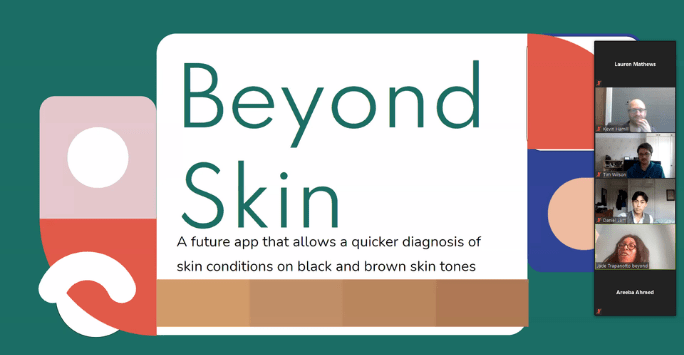
The Beyond Skin team pitch to the Dragons.
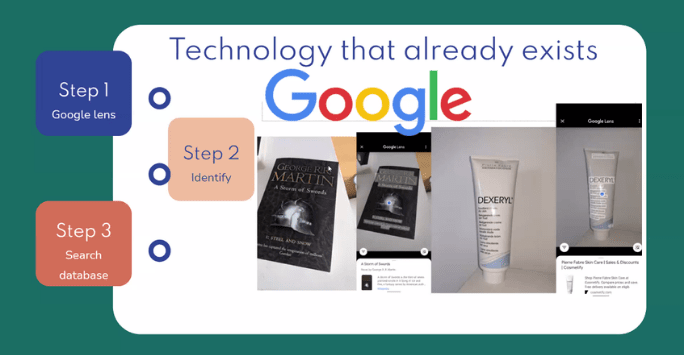
Student Doctor Nina Counsell presented the winning idea on behalf of the team. “We tried to come up with an app that we believed would really benefit a large proportion of the population. I designed the interface and understanding our audience and catering to the correct demographic was a big influence in how it turned out. There would be no point in having an app with great features, if the people who would benefit most weren't able to use it."
I think our idea worked so well because we tried to keep it as simple as possible.
"We wanted to focus on the main idea we had at the beginning - an app to help people with their medications. I am so happy with what we achieved and I am really proud of the whole team.”
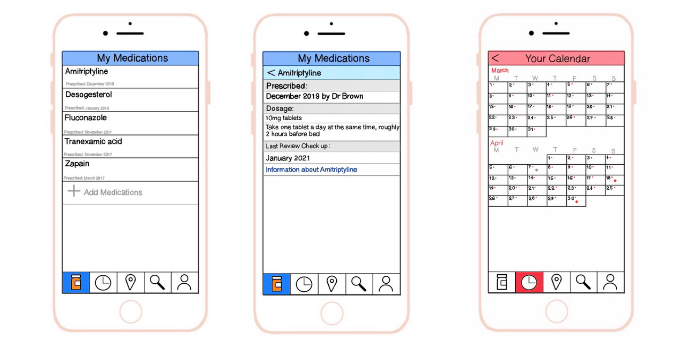
The designs behind the winning app, Medipal.

Panellist Vidhi Taylor-Jones, Director of Simulation, was thrilled to be a part of the event and highly impressed with the professional standards of the pitches, “The detailed and very creative ideas were presented with real flair. Having worked in innovation and digital tech in the School of Medicine, I was delighted to see one of the ideas for a hospital “map” using augmented reality, because this was an idea we had already explored in real life in the school, which just goes to show the students have their finger on the pulse of digital technology."
The future of healthcare innovation is safe in the hands of our student doctors!
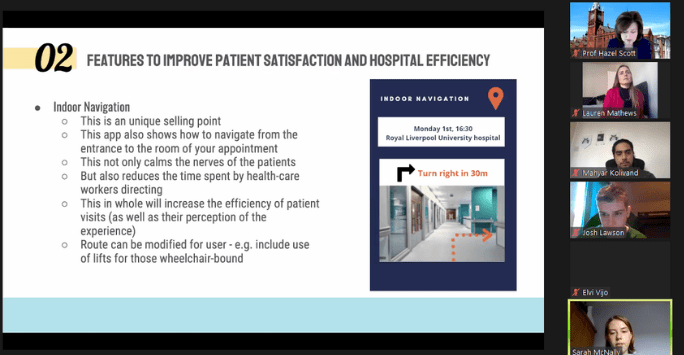
The Medmap team present their innovative idea.
The Year 1 team was also delighted with the input from students. Student Experience Administrator Alice Munday says, “Like our students, we were disappointed that we couldn’t go ahead with Altcar this year. However, we enjoyed developing this new leadership task and were very impressed with the standard of the ideas that all our Year 1’s came up with!"
Similar praise comes from Student Experience Administrator Emma Lamont, "I would like to thank all of the students for their professionalism and hard work. We were hugely impressed by the presentations and level of research and I thoroughly enjoyed watching them and the genuine enthusiasm behind the ideas. I am sure some of the real dragons would actually invest! Well done to all!”
Year 1 Director Dr Kevin Hamill hopes hope the students enjoyed the activities as much as he did. "As educators, although we often consider the ways in which we can teach, we can forget just how much we can learn from our students. This exercise was one of those great events where I learned a lot. I was thoroughly impressed by every pitch I saw across the heats and finals."
Medicine will continue to embrace new technology and evolve as profession, it really is clear to me that we are teaching the leaders of tomorrow.
School Dean Professor Hazel Scott thoroughly enjoyed her role of dragon in the exercise, marvelling at the achievements of the School’s newest cohort. “The superb quality of those who joined our community in 2020 was brilliantly showcased by the Dragon’s Den event. I found it hard to stay on point with serious ‘dragon’ questions when inside I wanted to smile with delight at the ingenuity, attention to detail and professionalism on display. Picking a winner was very hard and all the teams are to be congratulated."
Thinking ‘outside the box’, and engaging different people in the development of new approaches to medical care, rather than just deliver ‘the norm’, will be key to future medical leadership of complex systems. It was great to see this displayed by each of our teams.
Lt Col Helen Ball concludes, “The work and thought processes that had gone into the final products was phenomenal. It was evident that some of the ideas had stemmed from personal experiences, and of course their initial first year of training which should be commended. As a panel we only saw the final six teams, which proved to be a difficult enough task due to the quality of the products and pitches, and I'm sure it had been equally as difficult for panellists in the heats."
I congratulate all teams for the ideas, skills, time, teamwork and the obvious research involved.
"This event will have provided you all with a richer knowledge and a more strategic outlook for the future within the NHS. We look forward to seeing you for the Regimental Insight days in Year 3.”